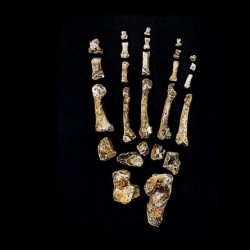Fast Change
People change — not just individually, but as a species. And according to UW anthropology professor John Hawks, people appear to be changing faster than scientists previously imagined.
For decades, the standard biological line held that humans haven’t evolved significantly during the last 50,000 years. But drawing on data gleaned from the human genome project, Hawks and other evolutionary scientists suspect that the standard line is completely wrong. The human species isn’t only continuing to evolve — the pace of evolution may be speeding up.
“There’s a disequilibrium,” Hawks says. “When we look at variation in the human genome, we find that a lot of it has occurred recently.”
Hawks and his colleagues rely on a set of data called the International HapMap, a catalog of the genetic variations that occur in human beings. Looking at the HapMap, they counted the number of variations, then estimated how long in the past each occurred. They found a surge of variation in recent millennia.
“There are about a thousand changes that seem to appear in just the last ten thousand years,” Hawks says. “In the previous 40,000, there are only about 800 changes.”
Some of those changes are superficial characteristics, such as the lightening of skin that occurred in Europeans and Asians. Many others, however, seem to be the result of adaptations to disease. “More than two dozen genes seem to have evolved for resistance to malaria alone,” Hawks says.
He suggests several reasons why genetic change may be speeding up. Population growth encourages more new mutations to appear, he notes, and improvements in transportation have increased contact among different populations, enabling DNA changes to spread farther afield.
Published in the Fall 2009 issue



Comments
No comments posted yet.